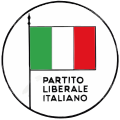Italian Liberal Party
The Italian Liberal Party (Italian: Partito Liberale Italiano, PLI) was a liberal political party in Italy.
For the modern-day party with the same name, see Italian Liberal Party (1997).
Italian Liberal Party Partito Liberale Italiano
PLI
- Giovanni Giolitti (first)
- Raffaele Costa (last)
8 October 1922
6 February 1994
Federation of Liberals[1]
(legal successor)
Union of the Centre[1]
(split)
L'Opinione
Italian Liberal Youth
173,722 (max)[2]
National Bloc (1922–24)
National List (1924–26)
CLN (1943–47)
UDN (1946–48)
National Bloc (1948–49)
Centrism (1947–58)
Pentapartito[3] (1980–91)
Quadripartito (1991–94)
The PLI, which was heir to the liberal currents of both the Historical Right and the Historical Left, was a minor party after World War II, but also a frequent junior party in government, especially after 1979. It originally represented the right-wing of the Italian liberal movement, while the Italian Republican Party the left-wing. The PLI disintegrated in 1994 following the fallout of the Tangentopoli corruption scandal and was succeeded by several minor parties. The party's most influential leaders were Giovanni Giolitti, Benedetto Croce and Giovanni Malagodi.
Ideology, position, factions[edit]
The party's ideological tradition was liberalism,[5][6][7][8][9][10][11] including different variants and factions. Indeed, as the party was at times the bulwark of secular conservatism and monarchism, it has been variously described as classical-liberal,[11][12] conservative-liberal,[13] liberist[8][11][14] (meaning economically liberal and/or right-libertarian), liberal-conservative,[15][16] and conservative.[17][18][19] The party's political position has been usually described as centre-right[20][21] and to the right of Christian Democracy, but sometimes also centrist.[22][23] The party always included more progressive factions, chiefly including the one that broke away to form the Radical Party in 1956, and, under the leadership of Valerio Zanone, it arguably became a centre-left party: while under Giovanni Malagodi the PLI refused any cooperation with the Italian Socialist Party, under Zanone and the "lib-lab" pact the party became a close ally of the Socialists.[24][25][26] Additionally it held laicist positions more similar to the other two centrist parties in the Pentapartito, Italian Republican Party and Italian Democratic Socialist Party.[23][27][28]



